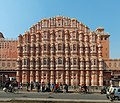Tourism in India by state
 From Wikipedia - Reading time: 52 min
From Wikipedia - Reading time: 52 min
This article has multiple issues. Please help improve it or discuss these issues on the talk page. (Learn how and when to remove these messages)
|
Tourism plays a growing role in India’s economy.[1] In 2016, the World Travel & Tourism Council estimated that tourism had generated a total of ₹14.02 lakh crore (US$170 billion) in revenue, accounting for 9.6% of the nation's GDP. Tourism now supports an estimated 40.343 million jobs, accounting for 9.3% of India’s total employment. According to some projections, India's tourism sector is predicted to grow at an annual rate of 6.8% and will have generated ₹28.49 lakh crore (US$340 billion) by 2027, at which point it will account for 10% of India's GDP.[2]
States and Union territories of India with their names.
Andaman and Nicobar Islands
[edit]First settled 26,000 years ago, the Andaman and Nicobar Islands form an archipelago of 572 tropical islands, out of which only 37 are inhabited.[3][4] Tourism plays a large economic role in the Andaman and Nicobar Islands. According to official estimates, the number of tourists visiting Andaman and Nicobar Islands tripled between 2016 and 2017, rising from 130,000 to 430,000.
Sitting on the fault line between the Indo-Australian and Sunda Plate, the topography of the islands reflects millions of years of volcanic and tectonic activity. Barren Island is the site of the only active volcano in South Asia, which regularly erupts between intervals of one and two years, its last eruption occurring as recently as 2024.[5]
The most famous historical site on the island is the Cellular Jail, a former prison built in 1906 during the British Raj. Located in Port Blair, the site became infamous for its inhumane conditions and its use as a political prison in which many members of India's independence movement were incarcerated. The grounds now serve as a museum and a memorial.
-
Coral reef near Jolly Buoy Island
-
Beach on Havelock Island
-
Natural bridge in Neil Island
-
Cellular Jail in Port Blair
-
Landing on Ross Island
-
Nicobar Island from offshore
Andhra Pradesh
[edit]
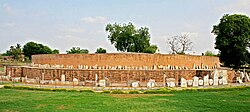





Hosting a number of Hindu and Buddhist pilgrimage sites, tourism in Andhra Pradesh is primarily driven by large numbers of pilgrims visiting from other parts of the country. According to a 2014 study published by The Economic Times, Andhra Pradesh alone accounted for 20% of the total domestic tourist visits across India in 2012.
Noted pilgrimage sites include:
- Venkateswara Temple: Located in the hills near Tirumala, the temple is the abode of Lord Venkateswara. The site also holds special significance for Vaishnavites, as it is among the one-hundred and eight Divya Desam temples dedicated to Lord Vishnu mentioned in the works of the Shaiva Nayanars. During the festival of Brahmotsava, held every year in the month of October, as many as 500,000 devotees climb 3550 steps from Alipiri to visit the temple.
- Kanaka Durga Temple: Temple dedicated to the Goddess Durga, situated on the Indrakeeladri Hill in the city of Vijayawada on the banks of Krishna River. The temple hosts yearly celebrations during the festivals of Dussehra, in late September/Early October, and Theppotsavam, in March. In celebration of these festivities, Pilgrims will often take a ritual dip in the Krishna River.[6]
- Mallikarjuna Temple: Situated at Srisailam in the Nallamala Hills of Kurnool district,[7] this temple is the abode of Lord Shiva and is one of India's twelve Jyotirlinga. It is believed that Lord Rama himself installed the Sahasralinga, while the legendary Pandavas placed the Panchapandava Lingas in the temple courtyard.
- Kodandarama Temple: 16th-century temple in Vontimitta, Kadapa district, dedicated to Lord Sri Rama.
- Pancharama Kshetras Temples: Group of five separate ancient temples, which according to legend originated from a single Lingam of Lord Shiva. They consist of Amararama Temple in Amaravathi, Draksharama Temple and Somarama Temple in Bhimavaram, Ksheerarama Temple in Palakollu, and Kumararama in Samalkota.
- Srikalahasteeswara Temple: Temple located Srikalahasti, Chittoor district on the banks of the river Swarnamukhi, that one among the Panchabhoota Lingas which represents Vaayu, known as Vaayu Linga. The remaining four lingas are located in Tamil Nadu.
- Eight Temples of Lord Narasimha: Part of a series of nine temples, eight of which are located in Andhra Pradesh. These are Simhachalam Temple, Antarvedi Temple, Vedadri Temple, Mangalagiri Temple, Penchalakona Temple, Ahobilam Temple, Yaganti Temple and Kadiri Temple. Ahobilam is counted among the one hundred and eight Divyadesams dedicated to Lord Vishnu, while Mangalagiri is one of the eight Swayambhu Kshetras of Lord Vishnu.
- Three Shakti Pithas Shrines: Shrines dedicated to the worship of Abi Shakti. They are Draksharamam, Pithapuram, and Srisailam.
- Veerabhadra Temple: Temple in Lepakshi, Sri Sathya Sai district, dedicated to Virabhadra, a fierce incarnation of Shiva. It contains the largest monolithic Nandi bull in the world, standing at 27 feet long and 15 feet high. The temple has a hanging pillar carved during the Vijayanagara Period.
- Veerabhadra Swamy Temple: Shrine to Veerabhadra located in middle of Godavari river near Pattiseema village, which is mentioned in the puranas.[8] Legend says that Lord Veerabhadra came here after his battle with Nishiva Yaga and washed his bloody sword in the river.
- Lord Hanuman Temple: Site located in Ponnur, Guntur district is a temple known for its monumental statue of Hanuman over twenty-three meters in height.[9] There is also a temple dedicated Garuda nearby.
- Lord Vighneshwara/Ganesha Temples: Group of temples located in Ainavilli Village, 12km from Amalapuram and Kanipakam, in Chittoor district
- Kotappakonda Temple: Also known as Trikutaparvatam, the temple a sacred pilgrim place near Narasaraopet in Guntur district. The year fesitval of Maha Shivaratri is celebrated here. Approximately 700,000 to 800,000 (7 or 8 lakhs) of devotees visit the temple per year.
- Hanuman Temple: Located near Kanchikacherla village, Krishna district, the temple stands at 135 metres tall.
- Other religious sites include Raghavendra Swami Mutt in Mantralayam in Kurnool district, Lord Venkateswara Temple in Dwaraka Tirumala in West Godavari district, Annavaram temple in East Godavari district, Arasavalli Surya temple, Srikurmam, and Srimukhalingam temples in Srikakulam District.
For other important temples, see List of Hindu temples in Andhra Pradesh.
Buddhist centres:
- Amaravathi – Guntur District
- Nagarjuna Konda – Guntur District
- Bhattiprolu – Guntur District
- Ghantasala – Krishna District
- Sankaram – Visakhapatnam District
- Bavikonda – Visakhapatnam District
- Thotlakonda – Visakhapatnam District
- Ramatheertham – Vizianagaram District
- Salihundam – Srikakulam District
- Lingapalem – West Godavari District
Others are Pavurallakonda, Chandavaram, Guntupalli, Adurru, Kummarilova, Kotturu Dhanadibbalu, Karukonda, Kapavaram and Nandalu.
Places of Interest:
- Araku Valley – Known as "Andhra's Ooty" near Vishakapatnam, is known for its coffee plantation.
- Undavalli caves – A four-storied, monolithic cave carved out from a hill during the 4th century AD.
- Gandikota Fort – Built on the banks of river Penna, comprising the Madhavaraya and Ranganatha temples.
- Thimmamma Marrimanu – The world's largest banyan tree, which in 1989 was declared to be the largest tree in the world by the Guinness Book of World Records. Marrimanu's branches extend over 5 acres (2.1 ha).
- Prakasam Barrage – A bridge by the British Government in remembrance of Tanguturi Prakasam.
- Kolleru Lake – One of the largest freshwater lakes in India, situation between the Krishna and West Godavari District.
- Pulicat Lake – Second largest Brackish water lagoon in India, covering an area of approximately 500km2, located on the border of Andhra Pradesh and Tamil Nadu along the Bay of Bengal. The lake is a protected nature reserve known as the Pulicat Lake Bird Sanctuary, a feeding and nesting ground for aquatic and terrestrial birds such as pelicans and flamingos, and is a frequent stop for many species of migratory birds.
- Uppalapadu Bird Sanctuary – A bird sanctuary in Uppalapadu, Guntur district, Andhra Pradesh. It is visited by around 8,000 species of birds from around the world, especially during the migration season between October and January.
- Ethipothala Falls – Waterfalls located in Macherla mandal, Guntur district on the river Chandravanka, a tributary of the river Krishna. The waterfall is located 11km away from the Nagarjuna Sagar Dam.
- Borra Caves – Cave system in the Ananthagiri Hills of the Eastern Ghats Range, near Visakhapatnam at an altitude between 800m to 1,300m above sea level. Discovered in 1807 by the British geologist William King George, the caves are known for their million-year-old stalactite and stalagmite formations. The name of the caves comes from a formation inside the caves that resembles a human brain, which in the Telugu language is known as burra.
- Belum Caves – Cave system in the Kurnool district with length of 3,229 metres (10,594ft), making them the second largest natural caves on the Indian subcontinent. The name of the caves come from Bilum, the Sanskrit word for caves. The caves contain long passages, spacious chambers, freshwater galleries, and siphons. The cave's deepest point is known as Patalganaga, located 120 feet (37m) from the entrance.
- Indira Gandhi Zoological Park – A zoo situated in the reserved forests of Visakhapatnam district.
- Sri Venkateswara National Park – National park situated at the reserved forests of Tirumala hills, Chittoor district. The area is known for its waterfalls such as Talakona, Gundalakona, and Gunjana.
- Horsley Hills – A group of mountains situated in Madanapalle, Chittoor district, home to rare species of flora and fauna.
- Suryalanka beach – A beach resort developed by APTDC, located 8km from the town of Bapatla, Guntur district.
- Rajahmundry – City in Andhra Pradesh noted for its cultural institutions and prominent works of architecture and civil engineering. These include Godavari Bridge, Iskon Temple, Tantikonda, Sir Arthur Cotton Museum, Pushkar Ghat, Gowthami Ghat. The city is known for its celebration Pushkaram, a festival held once every twelve years, held along the Godavari River. An estimated 4 to 5 crore (40,000,000 to 50,000,000) people participate in the festival.
- Visakhapatnam – Largest and most populous city in Andhra Pradesh. Notable attractions include the INS Karasura Submarine Museum, Yarada Beach, and VUDA Park.
Arunachal Pradesh
[edit]This section may contain material unrelated to the topic of the article. (April 2025) |
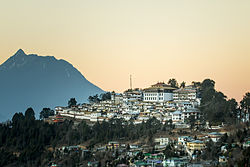
Arunachal Pradesh is mentioned in the literature of Kalika Purana and Mahabharata. This place is supposed to be the Prabhu Mountains of the Puranas. It was here that sage Parashuram washed away his sin, sage Vyasa meditated, King Bhishmaka founded his kingdom and Lord Krishna married his consort Rukmini.
There are places of worship and pilgrimage such as the Parasuramkund and the 400‑year‑old Tawang Monastery, or the sites of archaeological excavations like Malinithan and Itanagar, the natural environment of lakes such as Ganga lake or Sela lake or the numerous variations of the snow-clad silver mountain peaks and green meadows where thousands of species of flora and fauna prosper. In addition, the state provides abundant scope for angling, boating, rafting, trekking, and hiking. There are a number of wildlife sanctuaries and national parks with rare animals, birds, and plants.
Assam
[edit]
Assam is the central state in the North-East Region of India and serves as the gateway to the rest of the Seven Sister States. Assam has a number of wildlife reserves – the Kaziranga National Park, which is home to the great Indian one-horned rhinoceros, the Manas National Park, Dibru-Saikhowa National Park, Nameri National Park and Pobitora Wildlife Sanctuary (These first two parks are UNESCO World Heritage Sites); the largest river island Majuli,[10] known for its Vaishnavite Sattras; historic Sivasagar, known for the ancient monuments of Ahom Kingdom; and the city of Tezpur and the scenic tea-estates and rubber plantations dating back to time of British Raj. The weather is mostly sub-tropical. Assam experiences the Indian monsoon and has one of the highest forest densities in India. The heritage of Madan Kamdev is the same as Khajuraho which is located just 30 km away from Guwahati. Along with the Madan Kamdev tourists can visit the Gopeswar Mandir temple situated in a village Deuduar near Guwahati. Basudev Than is a more than 300-year-old Satra in Assam.
Assam has a rich cultural heritage going back to the Ahom Kingdom, which governed the region for many centuries before the British occupation. Other notable features include the Brahmaputra River, the mystery of the bird suicides in Jatinga, and numerous temples including Kamakhya Temple of Tantric sect. Gurdwara Sri Guru Tegh Bahadur, also known as Damdama Sahib at Dhubri, is situated in the heart of the Dhubri Town on the bank of the Brahmaputra river in far north-east India. Guru Teg Bahadur, the Sikh Guru, visited this place in 1505 and met Srimanta Sankardeva (the founder of the Mahapuruxiya Dharma) as the Guru traveled from Dhaka to Assam, ruins of palaces, etc. Guwahati, the capital city of Assam, boasts many bazaars, temples, and wildlife sanctuaries. The government is taking many initiatives to promote tourism in Assam.
Bihar
[edit]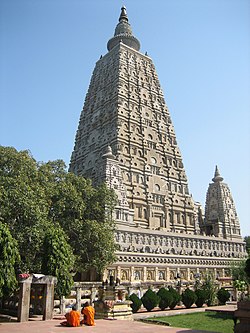
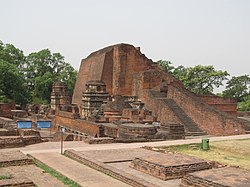
Bihar is one of the oldest continuously inhabited places in the world, with a history of more than 3000 years. The rich culture and heritage of Bihar are evident from the ancient monuments that are dotted all over the state. This is the place of Mahavira, the 24th and last Tirthankara, Aryabhata, Great Ashoka, Chanakya, Gautama Buddha, Mahavira, Guru Gobind Singh, Chandragupta Maurya, Vātsyāyana, Sher Shah Suri, and many other great historical figures.
On an average, 20 million domestic tourists and 1 million foreign tourists visit Bihar annually.[11]
Attractions:
- Patna – The capital of Bihar, known for its rich history and royal architecture
- Gaya – Known for Bodh Gaya, where Gautama Buddha attained enlightenment under the Bodhi Tree at Mahabodhi Temple. It is a UNESCO World Heritage Site. Gaya is also known for the Hindu Vishnupad Temple where Lord Vishnu purportedly killed the demon Gayasura, and the Mangla Gauri Temple, which is among the eighteen Maha Shaktipeeths. The Phalgu River is a notable pindadan site for Hindus.
- Muzaffarpur – Known for its education Garibnath Mandir, Sikandarpur mann, Devi Mandir, Banglamukhi Mandir, Jai Mata Di Mandir, Jubba Sahani park [12]
- Darbhanga – It is among the oldest cities of Bihar. Famous for the Maharaja forts and Kali Mandir.
- Nalanda – Location of one of the world's oldest university
- Kesariya – Location of the world's largest Buddhist Stupa
- Sasaram – Tomb of Sher Shah Suri, the great emperor of medieval India
- Sonepur Cattle Fair – The Sonepur cattle fair or Sonepur Mela, is the biggest cattle fair in Asia and stretches on from fifteen days to one month
- Takht Sri Patna Sahib – A Sikh pilgrimage known as the birthplace of Sikh's Tenth Guru Sri Guru Gobind Singh Sahib
- Munger – Home to the only Yoga University in the world, Bihar School of Yoga. Religious places such as Shakti Peethas.
- Vaishali – Lord Mahavir was born on the outskirts of this ancient city and lived in Vaishali until he was 22
- Champapuri - It is one of the most sacred places of Jainism. Lord Vasupujya, the 12th Jain Tirthankara was born in Champapuri and it is the place where all the five kalyanaks of Lord Vasupujya took place. Location of 31 feet monolithic statue, the tallest statue of Lord Vasupujya. Sitamarhi: It is a native place of Devi Sita Mata.
- Rajgir - It is sacred to Buddhism and Jainism. The place has temples belonging to Jainism, Buddhism and Hinduism. The ancient site also has Son Bhandar Caves.
- Pawapuri - Mahavira, the last of the twenty-four Tirthankara attained Nirvana or moksha (liberation). He was cremated at Pawapuri. There was a great rush to collect his ashes, with the result that so much soil was removed from the place of his cremation that a pond was created.[13]
- Maa Tara Chandi Temple
Chandigarh
[edit]
Chandigarh is a city located on the foothills of the Himalayas and is the capital of two states – Punjab and Haryana. Chandigarh is also called "City Beautiful" with various tourist attractions such as Nek Chand Rock Garden, Zakir Hussain Rose Garden, Sukhna lake, Open Hand Monument and Capitol Complex which is a UNESCO World Heritage Site. This place was recorded as the Cleanest city of India by Ministry of Urban Development, Government of India. A view of the Shivalik Hills including Kasauli is visible from here. Chandigarh is one of the earliest planned cities.
Chhattisgarh
[edit]
Chhattisgarh is a recent state with an ancient civilisation, hosting a number of historical remains. It has 41.33% of its area under forests and is one of the most bio-diverse areas in the country. It is India's tenth-largest state and situated in the heart of India. The state has many ancient monuments, rare wildlife, temples, Buddhist sites, palaces, waterfalls, caves, rock paintings, and hill plateaus. Most of these sites are untouched and unexplored.
Main attractions of Chhattisgarh are Chitrakot Waterfalls, Kutumsar Caves, Ramgarh and Sita Bengra, Bhoramdeo temple, Arang temples, Sirpur, Rajim, Ratanpur and Malhar. Kakotal is also famous for its waterfall.
Delhi
[edit]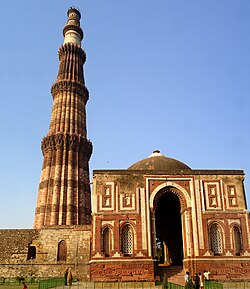
Delhi is the capital union territory of India. A blend of ancient and modern, Delhi is a very popular tourist site. It is a metropolitan city comprising more than 10% of India's population. Old Delhi has been the capital of numerous empires that ruled India, which makes it rich in history. New Delhi, on the other hand, is a modern city designed by Edwin Lutyens and Herbert Baker. The various rulers left behind their trademark architectural styles. Delhi currently has many historic monuments and landmarks such as the Tughlaqabad fort, Qutub Minar, Purana Quila, Lodhi Gardens, Jama Masjid, Humayun's tomb, Red Fort, and Safdarjung's Tomb. Modern monuments include Jantar Mantar, India Gate, Rashtrapati Bhavan, Laxminarayan Temple, Lotus Temple, Lal Mandir and Akshardham Temple. New Delhi is famous for its British colonial architecture, wide roads, and tree-lined boulevards. Delhi is home to numerous political landmarks, national museums, Islamic shrines, Hindu temples, green parks, and trendy malls.
Goa
[edit]
Goa is one of the most famous tourist destinations in India. A former colony of Portugal, Goa is famous for its beaches, nightlife, Yogas, Nature trails, spas and massage, casinos, flea markets and shopping, water sports activities like cruising, Portuguese churches, Hindu temples, and wildlife sanctuaries. The Basilica of Bom Jesus, Se Cathedral, Mangueshi Temple, Dudhsagar Falls, Shantadurga, Anjuna Beach, Aguada Fort, and Chapora Fort are famous attractions in Goa. Recently, a Wax Museum (Wax World) has also opened in Old Goa housing a number of wax personalities of Indian history, culture, and heritage.
The Goa Carnival is a world-famous event, with colorful masks and floats, drums and reverberating music, and dance performances.
Gujarat
[edit]


Gujarat, the seventh largest state in India, is located in the western part of India with a coastline of 1600 km, the longest in India. It is the tenth most popular state in the country for tourists with an annual footfall of 18.9 million tourists.[14] Gujarat's natural environment varies from the Great Rann of Kutch to the hills of Saputara. Gujarat is the sole home of the pure Asiatic lions and is considered to be one of the most important protected areas in Asia. Ancient Dholavira, archaeological site in Kutch District and Lothal,[15] archaeological site in Ahmedabad district contains ruins of ancient Indus Valley civilization city, arguably Lothal[15] had the world's earliest known Dock.[incomprehensible] The ruins of Dholavira are one of the largest Harappan archaeological sites.[16]
During the Sultanate's reign, Hindu craftsmanship mixed with Islamic architecture, giving rise to the Indo-Saracenic style. Many structures in the state are built in this fashion. It is also the birthplace of Mahatma Gandhi and Sardar Vallabhai Patel, important figures of India's Independence movement. Gujarat offers business tourism, archaeological and heritage tourism, cultural tourism, religious tourism, wildlife tourism, and medical tourism. Amitabh Bachchan is currently the brand ambassador of Gujarat Tourism. Ahmedabad is considered an ideal hub to cover all the destinations across Gujarat. In 2018, the Statue of Unity, a 597 ft. tall statue in honour of Vallabhbhai Patel (1875–1950), was unveiled in Gujarat. Gujrat is also known for its business culture, and many big businessmen and industrialists such as Mukesh Ambani and Gautam Adani are from Gujrat. Its also known for the largest office building in the world, Surat Diamond Bourse (SDB), which is a diamond trade centre located in DREAM City, Surat, Gujarat. It is also known for its food, Jalebi-Fafda, and their own dance, Garba.
-
The cluster of Jain temples on Girnar mountain near Junagadh
-
Asiatic lions are found only in Gir Forest National Park
Haryana
[edit]
The pilgrim places of Haryana are thronged by devotees all over the year, who visit the important religious places to seek divine blessings and eternal happiness.
The state of Haryana has a long historical and cultural tradition which is manifested in numerous religious places. Some of the notable "Pilgrim Destinations" of Haryana are:

Kurukshetra- The historical place of "Kurukshetra" is the cradle of Hindu civilisation. The battlefield of the holy land of "Kurukhshetra" is a witness to the discourse between the mighty and valiant ruler "Arjuna" and his divine charioteer "Lord Krishna".
Jyotisar- the nurturing ground of the values and principles that guide Hinduism. The significance of the place lies in the fact that the holy religious text of the Hindus, the Bhagwad Gita was compiled in this sacred place
Thanesar- The sacred place of Thanesar has two important religious temples: the Sthanesvar Mahadev Temple and the Ma Bhadra Kali Temple that draw several devotees throughout the year.
Pehowa- The holy land of Pehowa is an important religious place among the Hindus, who pray to the deceased member of their family and offer Pind Daan to release them from the cycle of birth and rebirth
Khatushyam The holy place from the time of Mahabharata.
Panchkula- Panchkula has numerous places of religious and historical importance, including Morni hills and Tikkar Taal.
Dhosi Hill – A hill near Narnaul, having Vedic period Rishi, Chaywan's Ashram. Famous for preparation of Chyawanprash, and other herbal preparations.
Pharal- Phalgu Tirth is an Indian pilgrimage site, where pilgrimages are undertaken by the Hindus during the Shraadhs. It is located in Pharal village in the Pundri sub-tehsil of Kaithal district in Haryana state. Pharal village is located between Pundri and Dhand in Kaithal district 24 kilometres (15 mi) away from district headquarters in Kaithal and 34 kilometres (21 mi) to Kurukshetra city.
Himachal Pradesh
[edit]


Himachal Pradesh is famous for its Himalayan landscapes and popular hill-stations. Tourism is the state contributes a major part in its economy and growth. Outdoor activities such as rock climbing, mountain biking, paragliding, ice-skating, and heli-skiing are popular tourist attractions in Himachal Pradesh.[17]
Shimla, the state capital, is a very popular hill station among tourists. One can reach Shimla by road, train, and by air. The Kalka-Shimla Railway is a narrow gage mountain railway which is a UNESCO World Heritage Site. Other popular hill stations include Manali, Dalhousie and Kasauli.
Dharamshala, home of the Dalai Lama, is known for its Tibetan monasteries and Buddhist temples. Many trekking expeditions also begin here. It is located in the Kangra valley at the foot of the Dhauladhar mountains. Manali is famous for skiing, snowboarding and other adventure sports such as white water rafting. Bir is known for paragliding and cultural events like Bir Music Festival. The Spiti Valley is well known for its unique landscapes and culture.
-
Kalka–Shimla Railway is a mountain railway in Himachal Pradesh.
-
Skiing in Manali
-
Rohtang Pass in Himachal Pradesh
Jammu and Kashmir
[edit]
Kashmir is renowned for its landscapes, ancient temples and mosques, Hindu and Muslim shrines, castles, gardens, and forts. The Hindu holy shrines of Amarnath in Kashmir Valley attract about 4 million Hindu devotees every year. Vaishno Devi also attracts millions of Hindu devotees every year. The region's historic monuments feature a blend of Islamic and Hindu architectural styles.
Tourism forms an integral part of the Kashmiri economy. Often dubbed "Paradise on Earth", Kashmir's mountainous landscape has attracted tourists for centuries. Notable places are Dal Lake, Srinagar Pahalgam, Gulmarg, Yeusmarg, Mughal Gardens, etc. Kashmir's natural landscape has made it one of the popular destinations for adventure tourism in South Asia.
-
Amarnath Temple near Pahalgam is open only during summer months
-
Gulmarg Gondola - The second highest cable car in the world
-
Vaishno Devi Temple near Jammu, attracts millions of pilgrims annually
Jharkhand
[edit]Jharkhand is an eastern state of India, formed in 2000. It is known for its forest cover and mine reserves. One of the biggest tourist attractions in Jharkhand is the Vaidyanath Jyotirlinga situated in the Deoghar district. Shikharji, located on Parasnath hill (the highest mountain in the state of Jharkhand), is the most important Jain Tirtha (pilgrimage site), believed to be the place where twenty of the twenty-four Jain tirthankaras, along with many other monks, attained Moksha.[18][19]
Ranchi, the capital of Jharkhand is famous for its numerous waterfalls on the outskirts of the city.
Baidyanath Temple at Deoghar, is one of the twelve Jyotirlingas, the most sacred abodes of Shiva, during the month of Shraavana, Shravani Mela is an important festival here.[20]
Densely covered in forest, the state has many wildlife sanctuaries including Topchanchi wildlife sanctuary[21] and Palamu wildlife sanctuary.[22]
Karnataka
[edit]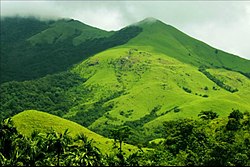


Karnataka has been ranked as fourth most popular destination for tourism among states of India.[23] It has the highest number of national protected monuments in India, at 507.

Kannada dynasties like Kadambas, Western Gangas, Chalukyas, Rashtrakutas, Hoysalas, Vijayanagaras and the Kingdom of Mysore ruled from what is today Karnataka.[24][25] They built monuments to Buddhism, Jainism and Hinduism. These monuments are preserved at Badami, Aihole, Pattadakal, Mahakuta, Hampi, Lakshmeshwar, Sudi, Hooli, Mahadeva Temple (Itagi), Dambal, Lakkundi, Gadag, Hangal, Halasi, Galaganatha, Chaudayyadanapura, Banavasi, Belur, Halebidu, Sringeri, Shravanabelagola, Sannati, Nanjangud, Mysore, Nandi Hills, Kolar, Mudabidri, Gokarna, Bagali, Kuruvatti and many more. Notable Islamic monuments are present at Bijapur, Bidar, Gulbarga, Raichur and other parts of the state. Gol Gumbaz at Bijapur has the second largest pre-modern dome in the world after the Byzantine Hagia Sophia. Karnataka has two World Heritage Sites, at Hampi and Pattadakal. In Bellary, there are forts which were built by Tipu Sultan for protection.
Karnataka state has several palaces such as Bangalore Palace, Mysore Palace (also known as Ambavilas Palace), Tipu Sultan's Summer Palace, Nalknad Palace, Rajendra Vilas, Jaganmohan Palace, Jayalakshmi Vilas Mansion, Lalitha Mahal, Rajendra Vilas, Cheluvamba Mansion, Shivappa Nayaka Palace and Daria Daulat Bagh. Karnataka is famous for Jog falls of Shimoga District, the second-highest waterfalls in Asia. Karnataka has many beaches at Malpe, Kaup, Marvanthe, Karwar, Gokarna, Murdeshwara, Surathkal. Yana in Uttara Kannada, Fort in Chitradurga, Ramnagara near Bengaluru district, Shivagange in Tumkur district, Tekal in Kolar district, and Utsav Rock Garden in Shiggaon, Uttar Kannada are popular among rock climbers.[26]

Hill stations in Karnataka are generally unexplored and more pristine than better known ones in South India. Major hill stations in the state are Agumbe and Kodachadri in Shimoga District; Baba Budangiri, Kemmangundi, Kudremukh in Chikkamangaluru District; Biligiriranga Hills in Chamarajanagar District and Kodagu district (also known as Coorg).[citation needed] Other hilly town and regions are Mullayanagiri, Pushpagiri (or Kumara Parvatha), Nandi Hills, Chikkaballapur district, Kundadri, Tadiandamol, Talakaveri, Male Mahadeshwara Hills, Himavad Gopalaswamy Betta, Ambaragudda, Antara Gange, Savandurga, Kurinja, Yedakumeri, Siddara Betta, Bananthimari Betta, Skandagiri, Devarayanadurga and Madhugiri.[citation needed]
Karnataka is the state which has the highest population of tigers and elephants in India. It is also the state which has the third highest leopard population in India, making Karnataka the premier wildlife state of India. Karnataka has several wildlife sanctuaries and national parks such as, Bandipur Tiger Reserve, Nagarhole Tiger Reserve, Bhadra Tiger Reserve, Anshi-Dandeli Tiger Reserve, BRT Tiger Reserve Dandeli Wildlife Sanctuary, Dandeli; Ghataprabha Bird Sanctuary; Daroji Sloth Bear Sanctuary; Peacock sanctuary in Bankapura; Ranebennur blackbuck sanctuary, Haveri district; Deva Raya Wildlife Sanctuary, near Hampi; Attiveri Bird Sanctuary, near Hubli-Dharwad, Uttara Kannada; Anshi National Park, Uttara Kannada; Magadi Bird Sanctuary, Shirahatti; Bhimgad Wildlife Sanctuary;[27] Adichunchanagiri Wildlife Sanctuary;[28] Arabithittu Wildlife Sanctuary ;[29] Biligiriranga Swamy Temple Wildlife Sanctuary; Bhadra Wildlife Sanctuary; Brahmagiri Wildlife Sanctuary; Cauvery Wildlife Sanctuary; Melukote Temple Wildlife Sanctuary ;[30] in Mandya district; Mookambika Wildlife Sanctuary; Nugu Wildlife Sanctuary; Pushpagiri Wildlife Sanctuary; Sharavathi Valley Wildlife Sanctuary; Shettihalli Wildlife Sanctuary; Someshwara Wildlife Sanctuary; Talakaveri Wildlife Sanctuary; Gudavi Bird Sanctuary; Mandagadde Bird Sanctuary; Kaggaladu Heronry; Kokkare Bellur; Bankapura Peacock Sanctuary and Bonal Bird Sanctuary.
-
Jain Narayana temple inside Pattadakal complex, a UNESCO World Heritage Site
-
Hampi, a UNESCO World Heritage Site
Kerala
[edit]Kerala is a state on the tropical Malabar Coast of south-western India. It is popularly known as God's Own Country and nicknamed as one of the "10 paradises of the world" by National Geographic,[31] Kerala is famous especially for its eco-tourism initiatives. Its unique culture and traditions, coupled with its varied demography, have made it one of the most popular tourist destinations in India. Growing at a rate of 13.31%, the tourism industry significantly contributes to the state's economy. Kerala is known for its tropical backwaters, especially in Alappuzha, Kochi and Kuttanadu. The beaches in Trivandrum such as Kovalam and Varkala are also popular. In recent years, many other beaches in Kerala such as Fort Kochi and Cherai beach attract many local and foreign tourists. Munnar is the most visited hill station in Kerala.
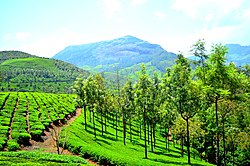
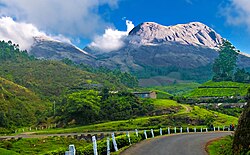
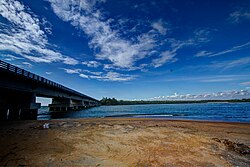

From the greenscapes of Idukki to cities like Trivandrum and Kochi, Kerala has a large collection of tourist spots. Popular attractions in the state include the beaches at Kovalam, Varkala, Cherai, Kappad and Muzhappilangad. The Fort Kochi Beach is one of the most visited beach by foreigners even though it is not used much for swimming. The hill stations of Munnar, Thekkady, Ramakkalmedu Nelliampathi, Ponmudi and Wayanad are very popular. The forts like the Bekal Fort in Kanhangad and St. Angelo's Fort in Kannur and the National Parks/ Wildlife sanctuaries at Periyar and Eravikulam attract a lot of local and foreign tourists. The "backwaters" region, an extensive network of interlocking rivers, lakes, and canals that centre on Alleppey, Kumarakom, and Punnamada, also see heavy tourist traffic. Heritage sites, such as East Fort, Kuthira Malika, Hill Palace, Mattancherry Palace are also famous. Cities such as Thiruvananthapuram, Kochi, Thrissur, Kozhikode and Kollam are popular centres for shopping and traditional theatrical performance.
Kerala has a very rich history. The oldest Synagogue outside the middle east is in Kerala. The oldest Christian churches in Indian subcontinent is in Kerala. The oldest mosque in Indian subcontinent is in Kerala.[clarification needed]
The Grand Kerala Shopping Festival (GKSF) claimed to be Asia's largest shopping festival and began in 2007.[32] Since then it has been conducted in December and January. During this period, stores and shops registered under the GKSF offer a wide range of discounts, vat refunds etc. Along with the shopping experience, shoppers are provided with gift coupons for a fixed value of purchase entering them into weekly and mega lucky draws. As compared to shopping festivals being held in other countries, this Festival converts the entire state of Kerala into a giant shopping mall, and includes both large and small businesses.
The state's tourism agenda promotes ecologically sustained tourism, which focuses on the local culture, wilderness adventures, volunteering and personal growth of the local population. Efforts are taken to minimise the adverse effects of traditional tourism on the natural environment, and enhance the cultural integrity of local people.
Madhya Pradesh
[edit]
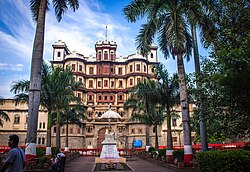

Madhya Pradesh is called the "Heart of India" because of its location in the centre of the country.[33] It has been home to the cultural heritage of Hinduism, Islam, Buddhism, Sikhism and Jainism. Monuments, temples, stupas, forts and palaces are dotted all over the state.
The temples of Khajuraho are known for their aphrodisiac sculptures, and are a UNESCO World Heritage Site. Gwalior is famous for its fort, Jai Vilas Palace, the Tomb of Rani Lakshmibai, Md. Ghaus and Tansen.
Famous national parks like Kanha National Park, Bandhavgadh, Madhav National Park, Shivpuri, Pench are located in Madhya Pradesh. Kuno Palpur national park is getting African cheetahs and is expected to become only reserve having four species of big cats (lion, tiger, leopard and cheetah). Madhya Pradesh is known for Narmada river, which is worshipped as a Hindu deity. Narmada originates from Amarkantak, a wild reserve and pilgrimage centre for Hindus. Another tourist destination is Bhedaghat Falls in Jabalpur. The river Narmada takes the form of massive falls here. The place is surrounded by marble of various colours. The prime attraction includes boating in the river.
Attractions include
♦Wildlife – Kanha National Park,[34] Bandhavgarh National Park(website), Pench Tiger Reserve
♦Heritage – Khajuraho Temple Group, Orchha, Bhimbetka Rock Shelters Caves
♦Worship – Ujjain,[35][36] Omkareshwar, Maheshwar, Maihar, Sanchi
♦Water Bodies / Lakes/ Dams – Bhojtal "Upper Lake- Bhopal", Gandhi Sagar Dam, Indirasagar Dam, Pipliyapala,[37] Tawa Reservoir, Bhedaghat[2]
-
Bhopal, is known as City of Lakes
-
Mahakal corridor in Ujjain
-
Patalpani waterfalls near Indore
-
The massive Bhedaghat Falls
-
Orchha Palace
-
Gwalior Fort in Gwalior city
-
Rock Shelters of Bhimbetka, a UNESCO World Heritage Site
-
Ancient temples of Amarkantak
-
Bandhavgarh National Park have highest known density of the tiger population
Maharashtra
[edit]


Maharashtra is one of the most visited states in India by foreign tourists,[23] with over 4.3 million foreign tourist arrivals in 2014. Maharashtra has a large number of popular and revered religious venues that are heavily frequented by locals as well as out-of-state visitors. Chhatrapati Sambhajinagar is the tourism capital of Maharashtra.[38][39]

Ajanta Caves, Ellora Caves, Elephanta Caves and Chhatrapati Shivaji Maharaj Terminus are the four UNESCO World Heritage Sites in Maharashtra and are credited for the development of tourism in the state.[40]
Mumbai, its capital, is the most popular cosmopolitan city in India. Mumbai is famous for Bollywood, the world's largest film industry. In addition, Mumbai is famous for its clubs, shopping, and upscale gastronomy. The city is known for its architecture, from the ancient Elephanta Caves, to the Islamic Haji Ali Mosque, to the colonial architecture of Bombay High Court and Chhatrapati Shivaji Terminus.
Maharashtra also has numerous adventure tourism destinations, including paragliding, rock climbing, canoeing, kayaking, snorkelling, and scuba diving. Maharashtra also has several national parks and reserves, including Tadoba with accommodation and safari experiences besides little known by wildlife destinations[incomprehensible] like Koyna, Nagzira, Melghat (disturbed with massive mining truck movement), Dajipur, Radhanagari and the only national park within metropolis city limits in the world – Sanjay Gandhi National Park. Other sites include the Bibi Ka Maqbara at Aurangabad, the Mahalakshmi temple at Kolhapur, the cities of Nashik and Trimbak (famous for religious importance), the city of Pune (which was the seat of the Prime Minister of the Maratha Empire) and the Hindu Ganesh Chaturthi celebrations. Mangi Tungi in Nashik is a very important pilgrimage of the Jain community. The 108 ft tall Statue of Ahimsa at Mangi Tungi, the tallest Jain Statue in the world attracts Jain devotees from around the world. This statue holds the Guinness world record for the tallest Jain idol.[41] Famous temples of Lord Ganesha, Shri Siddhivinayak Mandir, Mumbai and Dagadusheth Halwai Ganapati Temple, Pune are located in Maharashtra.
-
Lonar Lake, a notified National Geo-heritage Monument
-
Forts of Maharashtra are also called Green canyon of India
-
Kailasha temple(r. 756-773 CE), sculpted in a whole basalt rock cliff from the top down.
-
Khandoba Jejuri temple
-
Kalavantin Durg, one of many 'hill forts' used by the maratha empire.
-
A great hornbill in Raigad
Mahabaleshwar is a hill station in India's forested Western Ghats range, south of Mumbai. It features several elevated viewing points, such as Arthur's Seat. West of here is the centuries-old Pratapgad Fort, perched atop a mountain spur. Lingmala Waterfall lies eastward.
Manipur
[edit]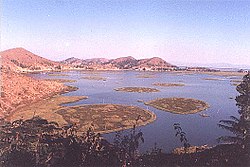
Manipur is a state in northeast India known for its greenery and moderate climate. The seasonal Shirui lily at Ukhrul district, sangai (brow antlered deer), and the floating islands at Loktak Lake are popular tourist destinations. Other tourist attractions are:
- Imphal (capital)
- Churachandpur
- Keibul Lamjao National Park
- War cemeteries
- Loktak Lake
- Moreh
Meghalaya
[edit]



Meghalaya has some of the thickest surviving forests in the country, constituting one of the most important ecotourism circuits in the country. The Meghalayan subtropical forests support a vast variety of flora and fauna. Meghalaya has two national parks and three wildlife sanctuaries.
Meghalaya also offers many adventure tourism opportunities in the form of mountaineering, rock climbing, trekking and hiking, water sports, etc. The state offers several trekking routes, some of which also afford an opportunity to encounter some rare animals such as the slow loris, assorted deer, and bear. The Umiam Lake has a water sports complex with facilities such as rowboats, paddle boats, sailing boats, cruise boats, water scooters, and speedboats.
Cherrapunjee is one of the most popular tourist spots in North East of India. It lies to the south of the capital Shillong. A 50-kilometre-long road connects Cherrapunjee with Shillong.
The popular waterfalls in the state are the Elephant Falls, Shadthum Falls, Weinia Falls, Bishop Falls, Nohkalikai Falls, Langshiang Falls and Sweet Falls. The hot springs at Jakrem near Mawsynram are believed to have curative and medicinal properties.
Balpakram National Park, also known as "Land of Spirits" by the Garos, is located in South Garo Hills district, Baghmara, with a landscape often compared to Grand Canyon of the USA.
Siju Cave is also a famous destination in the South Garo Hills region. It is 25 km long, surveyed by P. Chopra et al. in the 20th century.
Nokrek National Park is one of the famous places in the Garo Hills region. It is home to the mother citrus fruit known locally as "Me•mang Narangz" scientifically named Citrus indica.
Mizoram
[edit]Mizoram has a dramatic landscape and moderate climate. The state is rich in bird diversity, which has the potential to make it a major bird watching destination.[43] Mizoram is a stronghold for Mrs. Hume's pheasant (Syrmaticus humiae).[44] There is also a rare record of the wild water buffalo from the state.[45] There have been several records of sightings of the Sumatran rhinoceros from Mizoram, and Lushai hills.[46] A small population of wild elephants can be seen in Ngengpui and Dampa Sanctuaries.[47] Other sites include Mizo Poets' Square, also known as Mizo Hlakungpui Mual, in Mizo, as well as the Great Megaliths locally known as "Kawtchhuah Ropui".
Odisha
[edit]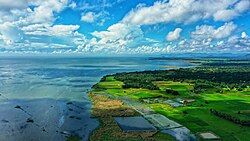




Odisha has been a destination from ancient days for people who have an interest in spirituality, religion, culture, art and the natural environment. Things to see in Odisha include ancient and medieval architecture, sea beaches, the classical dance Odissi and ethnic dance forms like Chhau, Ghumura and Sambalpuri, and a variety of festivals. Odisha also has a very rich variety of food. Rock-edicts lie by the banks of the Daya River. Buddhist temples exist at Udayagiri, Lalitgiri as well as Ratnagiri, on the banks of river Birupa. Odisha also has stupas, rock-cut caves, rock-edicts, excavated monasteries, viharas, chaityas and sacred relics in caskets and the Rock-edicts of Ashoka.
Odisha is famous for the Jagannath Temple (Puri), UNESCO World Heritage Site Konark Sun Temple and The Leaning Temple of Huma. Out of total 4 Chausathi Yogini temples all over India, 2 are in Odisha, in Hirapur and Ranipur Jharial. Oriya Sanskrit Poet Jayadeva, who wrote wrote the Gita Govinda, was born here in Kenduli Sasan village near Khurda.
Rajarani Temple is located in Bhubaneswar, containing more than 500 ancient temples. Lord Lingaraja Temple (a 12th-century AD temple), Kedaragauri Temple, Ananta Vasudeva Temple, Brahmeswara Temple are some of the other temples in the capital. Bhubaneswar has State Museum, Regional Museum of Natural History (having one of the two eggs of an extinct species), Botanical Garden, Jain centres like Udayagiri and Khandagiri Caves, Pathani Samanta Planetarium, Dhauli White Pagoda where Chandashoka became Dharmashoka.
Odisha is the home for various tribal communities who have contributed to the multicultural and multilingual character of the state with handicrafts, different dance forms, jungle products and their lifestyle blended with their healing practices. The Ratha-Yatra of Lord Jagannath in Puri and Sitalsasthi Carnival of Lord Shiva in Sambalpur are among the leading sights.
Netaji Subhas Chandra Bose was born in Cuttack, and his house (Janakinath Bhavan) is now a museum. The medieval capital of Cuttack has the Barabati fort (witnessing Gangas, Marathas and British), the silver filigree works, Katak Chandi Temple, Barabati Stadium, Qadam-I-Rasul and Dhabaleswar temple (having longest rope-bridge in India succeeded by Lakshman Jhula in Rishikesh). Eastern Ghats' highest peak, Mahendragiri, where Lord Parshuram is still in meditation according to Ramayana and Mahabharata, is in Gajapati district.
Sites/cities/places of interest:
1. Bhubaneswar – Lingaraj Temple, Rajarani Temple, Dhauligiri, Khandagiri and Udaygiri, Nandankanan Zoological Park.
2. Cuttack – Barabati Fort, Katak Chandi Temple, Lalitgiri-Ratnagiri-Udaygiri, Dhabaleswar Temple.
3. Puri – Jagannath Temple, Chilika Lake, Konark Temple and beach.
4. Sambalpur – Samaleswari Temple, Hirakud Dam.
5. Berhampur – Gopalpur-on-Sea, Taptapani, Taratarini, Sonpur
7. Mayurbhanj- Shimlipal [3] Biosphere Reserve
8. Dhenkanal – Kapilas, Saptasajya
9. Balasore – Chandipur-on-sea, Chandabali, Chandaneswar, Panchalingeshwar, Aradi (Lord Akhandalamani).
10.Balangir-Harishankar temple, 64 yogini temple
10.Kalahandi- Maa Manikeswari Temple, Bhawanipatna, Phurlijharan Waterfall
Puducherry
[edit]
The Union Territory of Puducherry comprises four coastal regions: Puducherry, Karaikal, Mahe and Yanam. Puducherry is the capital of this Union Territory and one of the most popular tourist destinations in South India. Puducherry has been described by National Geographic as "a glowing highlight of subcontinental sojourn". The city has many colonial buildings, churches, temples, and statues, which, combined with the systematic town planning and the French-style avenues, still preserve much of the colonial ambiance.
Punjab
[edit]

The state of Punjab is renowned for its cuisine, culture and history. Punjab has a vast public transportation and communication network. Some of the main cities in Punjab are Amritsar, Jalandhar, Patiala, Pathankot and Ludhiana. Nabha is famous as a manufacturing hub of combine harvesters and other manufacturing units, while Patiala is known for the historical forts. Punjab also has a rich Sikh religious history. Tourism in Punjab is principally suited for tourists interested in culture, ancient civilisation, spirituality and history. Some of the villages in Punjab have traditional Indian homes, farms and temples. Lonely Planet Bluelist 2008 has voted the Harmandir Sahib as one of the world's best spiritual sites with over 100,000 pilgrims and tourists visiting on a daily basis.
Another main tourist destination is the religious and historic city of Sri Anandpur Sahib where many tourists come to see the Virasat-e-Khalsa (Khalsa Heritage Memorial Complex) and also take part in Hola Mohalla festival. Kila Raipur Sports Festival is also popular tourist attraction in Kila Raipur near Ludhiana.[48][49][50] Shahpur kandi fort, Ranjit sagar lake and Muktsar Temple also popular attractions in Pathankot.
Rajasthan
[edit]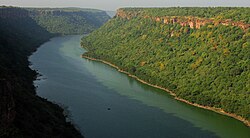


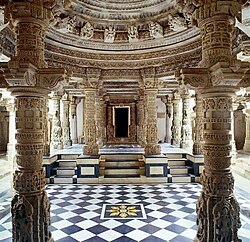
Rajasthan, literally meaning "Land of the Kings", lies in Western India. The vast sand dunes of the Thar Desert attract millions of tourists from around the globe every year.
Attractions:
- Jaipur – The capital of Rajasthan, famous for its rich history and royal architecture * Pink City
- Chittorgarh – Chittorgarh Fort, Vijay Stambh, Kalika Mata Mandir, Kirti Stambh, Rana Kumbha's Palace, Rani Padmini's Palace and temple of devotee of Lord Krishna, Meera (Meera Temple).
- Jodhpur – Fortress-city at the edge of the Thar Desert, famous for its blue homes and architecture and Blue City
- Udaipur – Known as the "Venice" of India *Lake City
- Jaisalmer – Famous for its golden fortress (one of the largest living forts), its palaces (Havelis), lake, fossil park, desert sand dune safaris-camps, desert national parks, Jain temples. The city is known as Golden City.
- Ajmer – Holy city, popular for the shrine of Sufi Saikhllnt Khwaja Moinuddin Chishti
- Barmer – Barmer and surrounding areas offer perfect picture of typical Rajasthani villages
- Bikaner – Famous for world-famous KARNI Mata Temple (The Rat temple) and medieval history as a trade route outpost
- Mount Abu – Is a popular hill station, the highest peak in the Aravalli Range of Rajasthan, Guru Shikhar is located here. Mount Abu is famous for Dilwara Temples.
- Ranakpur – Large Jain Temple complex, with around 1444 pillars and exquisite marble carvings
- Pushkar – It has the first and one of the very Brahma temples in the world
- Keoladeo National Park – A UNESCO World Heritage Site
- Nathdwara – This town near Udaipur hosts the temple of Shrinathji
- Sawai Madhopur – Famous for Ranthambore National Park and historic Ranthambore Fort
- Shekhawati – For traditional Havelis
- Dhosi Hill – Vedic period Hill, Chyvan Rishi Ashram
- [51]
-
Hawa Mahal in Jaipur
-
Jaisalmer Fort a UNESCO World Heritage Site in Jaisalmer
-
Ranthambore Fort a UNESCO World Heritage Site in Ranthambore National Park famous for tigers
-
Kumbhalgarh a UNESCO World Heritage Site in Rajsamand District
-
Thar Desert near Jaisalmer
Sikkim
[edit]

The capital of Sikkim is Gangtok, located approximately 105 kilometres from New Jalpaiguri, the nearest railway station to Sikkim. Although, Pakyong Airport is a domestic airport in East Sikkim, it is largely inoperative due to the sub-standard runway length and other logistic issues, the other nearest airport to Sikkim is Bagdogra Airport in West Bengal. Sightseeing places include Baba Mandir, Nathula Pass, Rumtek Monastery, Handicraft Shops, Tsangpo Lake, Chardham, Buddha Park, Ridgepark, Flower Shows (International Flowers Shows) Samduptse, Tashi View point Tashiding, Pelling, Yuksom, Rabdentse, Tibetology, Ropeway and Mt. Kangchenjunga.
The treks to Dzongri, Dzongku, Goechala and Gurudongmar Lake towards the northern part of the state are very popular and attracts domestic and international tourists. Numerous local tour operators registered and recognised by the Department of Tourism run various trekking programs in the state providing fooding, lodging, and travel.
Tamil Nadu
[edit]
Tamil Nadu was the most visited tourist destination by both Indian and International tourists in 2014 with over 320 million domestic visits and 4.6 million foreign visits. Tourism in Tamil Nadu is promoted by Tamil Nadu Tourism Development Corporation and by the state government, with the tagline enchanting Tamil Nadu. TTDC promotes tourism in the state by arranging various functions and events. The capital city of Chennai is the only place in India to be listed in "52 places to go around the world" by The New York Times. Marina beach in Chennai is the second longest beach in the world and Chennai is home to numerous historic temples and parks. Chennai is also nicknamed as the Gateway of South India.
- Temples
The state has three UNESCO World Heritage Sites which include the Great Living Chola Temples and Mahabalipuram. Archaeological sites with civilisation dating back to 3800 years[52] have been discovered in Tamil Nadu. The Mahabalipuram sea shore temples were built by rulers of Pallava dynasty. The Brihadeeswarar Temple in Thanjavur was built in 1010 AD.[53] Other major temples include Madurai Meenakshi Amman Temple, Ramanathaswamy Temple, Sri Ranganathaswamy Temple, Jambukeswarar Temple, Srivilliputhur Andal Temple and Arunachaleswara Temple.[54] All these temples showcase Dravidian architecture which was prevailed during the ancient period. The six abodes of Lord Murugan are situated in Tamil Nadu.
- Sanctuaries and national parks

The Western Ghats is one of the eight hottest biodiversity hotspots in the world and a UNESCO World Heritage Site.[55][56][57] The mangrove forests of Pichavaram are the second largest in the world[58] and the Gulf of Mannar Biosphere Reserve covers an area of 10,500 km2 of ocean, islands and the adjoining coastline including coral reefs, salt marshes, mangroves and is home to endangered aquatic species including dolphins, dugongs, whales and sea cucumbers.[59][60] The wetlands attract numerous migratory birds from Europe and America. The state government has established 13 bird sanctuaries to protect the birds from poaching and hunting. The state also has various bird sanctuaries including 13 established bird sanctuaries[61] The state is home to one of the largest populations of endangered Indian elephant and Bengal tiger.[62] The region is home to one-third of the tiger population and more than half of the elephant population of India.[63][64] There are four Project Tiger reserves and four Project Elephant reserves in the state which include Anamalai, Mudumalai, Sathyamangalam and Kalakkad-Mundanthurai.[65][66] Other threatened and endangered species found in the region include grizzled giant squirrel,[67] grey slender loris,[68] sloth bear,[69] Nilgiri tahr,[70] Nilgiri langur,[71] lion-tailed macaque,[72] and Indian leopard.[73] Kanyakumari is the southernmost tip of mainland India provides scenic view of sunset and sunshine over the Indian Ocean. Waterfalls like Hogenakkal Falls and wildlife sanctuaries are located across the state.
- Hill stations

Ooty, Kodaikanal and Yercaud are well-known hill stations. The Nilgiri Mountain Railway is a mountain railway built in 1908,[74] and operated by a fleet of steam locomotives.[75] In July 2005, UNESCO added the Nilgiri Mountain Railway as an extension to the World Heritage Site Mountain Railways of India.[75][76]
- Medical tourism
The state is a popular destination for medical tourism and the cities of Chennai and Coimbatore house some of Asia's premier hospitals.[77][78]
-
Stone chariot mandapam at Airavatesvara Temple in Darasuram
-
Ranganathaswamy Temple, Srirangam, largest Hindu temple in India
-
Tea plantation in the heights of Ooty.
-
Terraced farming in Kodaikanal
Telangana
[edit]


Telangana is one of the most frequented tourist places in South India. Hyderabad is one of the most developed cities in the country and a modern hub of information technology, ITES, and biotechnology. Hyderabad is known for its rich history, culture and architecture representing its character as a meeting point for North and South India. Hyderabad was ranked second best place in the world to visit in 2015 by National Geographic's Traveler magazine.[79]
- Birla Mandir, Hyderabad is a white marble Hindu temple of Lord Venkateshwara on the Naubath Pahad in Hyderabad.
- The Ramappa Temple and Thousand Pillar Temple in Warangal are famous for their temple carvings of the Kakatiya dynasty.
- Sammakka Saralamma Jatara is held every second year in Medaram.
- Gnana Saraswati Temple, Basar (Nirmal district) is a Saraswati temple.
- Sri Rajarajeshwara Temple – One of the famous and most visited Lord Shiva temple located in Vemulawada (Rajanna Sircilla district)
- Vemulavada temple is built by Chalukya Kings between AD 750 and 975.
- Yadagirigutta, the abode of an avatara of Vishnu, Sri Lakshmi Narasimha.
Famous Buddhist centres:
- Nelakondapalli – Khammam District
- Dhulikatta – Karimnagar District
- Phanigiri – Suryapet District
Pilgrim centres and temples:
- Bhadrachalam Temple – In Bhadradri Kothagudem district
- Ramappa Temple – Near to Warangal City
- Yadagirigutta – Yadadri Bhuvanagiri district
- Thousand Pillar Temple – Hanamakonda city in Warangal District
- Kuchadri sri venkateshwara swamy temple in Kuchanpally, Medak District[80][81]
Attractions:
- Charminar – Centre of the Hyderabad Old City
- Golkonda Fort – Largest and 400 years oldest fort
- Chowmahalla Palace – It was the official residence of the Nizams of Hyderabad.
- Ramoji Film City – Largest Film City in the world situated in Hyderabad City
- Warangal Fort – Oldest fort built by Kakatiya before 13th century reflects the culture of Telugu people
- Thousand Pillar Temple - Built by King Rudra Deva in 1163 AD. The Thousand Pillar Temple is a specimen of the Kakatiyan style of architecture of the 12th century.
- Surendrapuri – A Mythological Awareness Centre near Yadagirigutta, 60 km from Hyderabad
- Salar Jung Museum – It is one of the three National Museums of India,[82] situated in Hyderabad City.
Golkonda (Telugu: గోల్కొండ, Urdu: گولکوندا), a ruined city of south-central India and capital of the medieval kingdom of Golkonda (c. 1364 – 1512), is situated 11 km west of Hyderabad.
Tripura
[edit]

- Ujjayanta Palace – The gleaming white Ujjayanta Palace located in the capital city of Agartala evokes the age of Tripura Maharajas. Constructed by the king of Tripura Maharaja Radha Kishor Manikya during the late 19th century and finished off in 1901, the Indo-Saracenic building is set up in a large Mughal-style garden with two man-made lakes on its both sides. The palace is of two-storied mansion and has three domes, each 86 feet high; a tile floor, and a curved wooden ceiling. Floodlights and a light and sound fountain have been set up in the palace for both locals and tourists.
- Unakoti – Located about 186 km from Agartala, Unokoti is an important site of archaeological wonder. It is a Shaiva pilgrimage attraction and dates back to the 7th to 9th centuries AD. The site consists of several huge vertical rock-cut carvings on a hillside. The site shows strong evidence of Buddhist occupation but also has a central Shiva head and imposing Ganesha figures having a height of 30 feet. The rocky walls also have a carved images of Hindu pantheon like Durga and Vishnu. The unakoti rock-cut carving have the distinction of being the largest bas-relief sculpture in India.
- Bhubaneshwari Temple – Another temple of eminence of Tripura is this temple. located 55 km from Agartala on the eastern fringe of Udaipur town by the bank of bank of river Gomati. The temple is now under the control of the Archaeological Survey of India. It was built by Maharaja Govinda Manikya (1660–1676). The temple is immortalised in Rabindranath Tagore's famous play known as Bisarjan and Rajarshi. Maharaja Govinda also features an important character in Tagore's play. While approaching Bhubaneshwari Temple one can find the ruins of the palace of the Maharaja. Down below the temple the river Gomati flows.
- Gunabati Group of Temples – From its name it reveals that it was built in the name of Maharani Gunabati (wife of Maharaja Govinda Manikya), in 1668 AD. The two other temples also bears contemporary look but there actual history is still unveiled. Architecture of these temples resembles other contemporary temples of Tripura except the top most parts are without Stupa. Core-Chambers are marked by a presence of pitcher circular core chamber and its vestibule which was large with Stupa like crown is crafted like a lotus[83]
- Chabimura – A famous panel of rock carving on the steep mountain walls on the banks of Gomati. There are huge images carved of Shiva, Vishnu, Kartika, Mahisasurmardini Durga and other Gods and goddesses. These images date back to the 15th or 16th century. Chabimura is 30 km away from Udaipur. It is situated in Amarpur subdivision. Devatamura means God's peak and it a full range between Udaipur and Amarpur Subdivision. It is famous for its many idols of gods and goddess. These images are carved on the rocky faces of Devtamura which is steep at 90 degrees. The hill ranges are covered with thick jungles and one cab reach this adobe of gods only after trekking through these jungles.
- Boxanagar – Recently after denudation of a nature forest area, ruins of a brick built building emerged in the northwestern part of Sonamura Sub-Division on the edge of the border with Bangladesh. The local people initially attributed the remains to the ancient temple of Manasa- the goddess of snake. Attention was drawn to the Archaeological Survey of India and they took over the site. A statue of The Buddha was discovered and it was confirmed that once upon a time it was a Buddhist Temple i.e. a Monastery. More than excavation of the site will unearth the hidden story.[84]
- Pilak, Tripura – a famous place of attraction for its archaeological remains from the 8th and 9th centuries. Pilak is situated at a distance of 144 km from Agartala. The place is a treasure house of Buddhist and Sculpture in the Hindu Sculptures. There runs a hilly rivulet near the place which is known as Pilak stream. Few temples with plaques of terracotta and stone images can be found here. Huge sculptures made of stones of Avalokiteśvara in the 9th century[85] and Narasimha image of the 12th century were found here. Both of there are now preserved in the Museum of Agartala. Even now one can find many sculptures of Goddess in Pilak as Lord Durga, Lord Ganesha, Lord Suriya, etc.[86] There is image of a God holding a lotus which is of ten feet high. There are terracotta images of Kinnars. Two bronze statue of Buddhas were discovered in Rishyamukh near Pilak. All these lead to establish that the place was once under the rule of Buddhist kings followed by Hindu rule in subsequent years. Pilak, the treasure-trove of archaeological riches has close association with Mynamoti and Paharpur in Bangladesh. It is believed that the area has more hidden treasures and as such recently further excavation drive has been taken up by Archaeological Survey of India. Tourist may find it delighted to explore the history of this lovely destination.
Uttarakhand
[edit]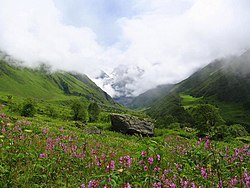
Uttarakhand, the 27th state of the Republic of India, is called "the abode of the Gods" or referred as the "Heaven on Earth". It contains glaciers, snow-clad mountains, valleys of flowers, skiing slopes, dense forests, and many shrines and places of pilgrimage. Chota Char Dham is a minor pilgrimage of the four most sacred and revered Hindu temples: Badrinath, Kedarnath, Gangotri and Yamunotri are nestled in the Himalayas, of which Badrinath is part of Char Dham, a major pilgrimage of four highly sacred Hindu temples.[87][88] Haridwar which means Gateway to God is the only place on the plains.
It holds the watershed for Gangetic river system spanning 300 km from Satluj in the west to Kali river in the east. Nanda Devi (25,640 ft) is the second highest peak in India after Kanchenjunga (28,160 ft). Dunagiri, Neelkanth, Chaukhamba, Panchachuli, Trisul are other peaks above 23,000 ft. It is considered the abode of Devtas, Yakashyas, Kinners, Fairies and Sages.[89] It has some old hill-stations developed during British era like Mussoorie, Almora, Dwarahat, Ranikhet and Nainital.
|
Glaciers |
Wildlife Reserves |
Adventure Sports |
-
The most sacred Hindu temple, Badrinath Temple.
-
Kedarnath Temple in Kedarnath town.
-
Jim Corbett National Park the oldest national park in India, famous for tigers
Uttar Pradesh
[edit]
Situated in the northern part of India and bordering New Delhi, Uttar Pradesh is one of the most popular tourist destinations in India. It is the home of Taj Mahal, as well as Hinduism's holiest city, Varanasi. Kathak, one of the eight forms of Indian classical dance, originated from Uttar Pradesh. Uttar Pradesh is known as The Heartland of India. The cuisine of Uttar Pradesh, such as Awadhi cuisine, Mughlai cuisine, and Kumauni cuisine, is very famous in India and abroad.
- Varanasi - The origin of Hinduism and one of the world's oldest cities. It is one of the seven sacred cities (Sapta Puri) in Hinduism, making it a significant pilgrimage site, especially for Lord Shiva devotees. The city is also famous for producing some of the finest textiles.

- Agra – Home to three World Heritage Sites: the Taj Mahal, Agra Fort & Fatehpur Sikri. Agra boast of several other historical monuments and gardens, such as the Tomb of I'timād-ud-Daulah and the Tomb of Akbar the Great.

- Prayagraj or Prayag - Kumbh Mela - The place where the Ganges, Yamuna and Saraswati rivers meet. A mass Hindu pilgrimage gathers at the Ganges river. Akbar forts. Triveni Sangam, Akshayavata, Alopi Devi Mandir, Khusro Bagh, Shankar Viman Mandapam, Nagvasuki Temple, Mankameshwar Temple, Shri Bade Hanuman Ji, Veni Madhav, Kalyani Devi, Lalita Devi are major attractions of the city. It is one the most popular religious centres of ancient and modern India for Hinduism. It is also Uttar Pradesh's administrative and education capital. The world's largest human gathering takes place here during the Kumbh Mela and Ardh Kumbh Mela. In the Kumbh of 2013, about 12 crore devotees came, and in the Ardh Kumbh of 2019, about 24 crore devotees came to Prayagraj. It is estimated that 50 crore devotees will come to the Maha Kumbh to be held in 2025, who will come from every corner of the world and take baths in Triveni Sangam. The government is also expected to get revenue of about Rs 3 lakh crore from the Kumbh Mela of 2025.
- Bithoor, the historical capital of Uttar Pradesh from where the Hindu god Brahma created the universe. It is situated about 10 km from Kanpur.

- Kanpur – Uttar Pradesh's important Industrial town and largest city of the state. It is the most cosmopolitan city of the state, with several historical places like Bithoor and Allen Forest Zoo. It is the second largest metropolitan city of North India with various historical and British Architectural buildings. The Kanpur Memoria Church or All Souls Memorial Church of Gothic architecture was built by Walter Granville in memory of those who died in the Siege of Cawnpore.
- Lucknow - The capital of Uttar Pradesh. It has several historical places with Mughal, British and modern architecture. The cuisine and chikan dresses of Lucknow is famous worldwide.
- Mathura - The birthplace of Lord Krishna of Hinduism and Neminath of Jainism and Holy City
- Ayodhya - The birthplace of Lord Rama of Hinduism
- Jhansi - centre of Rani Lakshmibai's battlefield against British
- Sarnath - where Gautama Buddha first taught the Dharma, and one of the four places of pilgrimage which his devout followers are expected to visit. It is also the birthplace of Shreyansanath, the eleventh Jain Tirthankar of the Jainism.
- Kushinagar - It is an important Buddhist pilgrimage site, where Gautama Buddha is believed to have attained Parinirvana after his death
- Chunar - It is the centre of clay art. Chunar has a 6th-century fort constructed by Chandragupta Vikramaditya. The fort itself had through rulers like Humayun, Sher Shah Suri and was gateway of Mauryan empire. It has waterfalls and natural spots.
- Fatehpur Sikri - Historical place for Mughal Empire's palaces and forts
- Meerut - The historical place of the Sepoy Mutiny of 1857 or the First War of Indian Independence. It has existed from the Mahabharata period of ancient India to modern India and is one of the fastest growing cities of Uttar Pradesh.
- Hastinapur: This is a popular religious site since it is believed to be capital of the Kauravas and birthplace of 3 tirthankar Shantinatha, Kunthunath and Aranatha.[90][91]

- Deogarh: This place is famous for Deogarh fort and its Gupta era Hindu and Jain temples dating back to 8th-9th century.[93] like Dashavatara Temple and Shantinath temple.
- Mirzapur Division - The hub of one of the world's finest carpet Industries, and a very popular tourist destination for its sightseeing and one of the fastest growing regions of Uttar Pradesh. It consists of vindhyachal shaktipeeth.
- Ghaziabad: Historical places from ancient India to modern India and India's fastest growing Industrial city. See Buddh International Circuit
- Noida and Greater Noida: IT, electronics and education hub of Northern India. India's biggest city with a planned and high-tech residential area.
- Gorakhpur: The city was home to Buddhist, Hindu, Muslim, Jain and Sikh saints. The birthplace of Paramhansa Yogananda, great Hindu emperor Chandragupta Maurya.
- Jaunpur: Historical city was founded by the Sultan of Delhi Feroz Shah Tughlaq and named in memory of his father, Muhammad bin Tughluq as Jaunpur Sultanate. Mughals, Lodis and Islamic ruler's Forts and ancient history of India.
- Dudhwa National Park – Dudhwa Tiger Reserve, Birds Sanctuary, Frog Temple at Oyal, Surat Bhawan Palace, elephant rides
- Rehar: Several major tourist attractions can be mentioned in the town's surroundings, like Jim Corbett National Park about 24 km, Nainital about 69 km.
- Vrindavan: A town in Mathura district, about 10 km from Mathura. Famous for Prem Mandir Vrindavan, Banke Bihari Temple and Vrindavan Chandrodaya Mandir.
- Ahichchhatra: is place where Parshvanatha attained Kevala Jnana. A number of Jain temples are built in area to commemorate Parshvanatha attaining Kēvalajñāna kalyāṇaka.[94]
West Bengal
[edit]

Kolkata (formerly Calcutta) is the capital of West Bengal and has been nicknamed the City of Palaces, City of Joy, etc. This comes from the numerous palatial mansions built all over the city. Unlike many north Indian cities, whose construction stresses minimalism, the layout of much of the architectural variety in Kolkata owes its origins to European styles and tastes imported by the British as it was the capital of British India from 1772 to 1911 and, to a much lesser extent, the Portuguese and French. The buildings were designed and inspired by the tastes of the English gentleman around and the aspiring Bengali Babu (literally, a nouveau riche Bengali who aspired to cultivation of English etiquette, manners and custom, as such practices were favourable to monetary gains from the British). Today, many of these structures are in various stages of decay. Some of the major buildings of this period are well maintained and several buildings have been declared as heritage structures. It has been known as the "Cultural Capital of India" for its culture which has led India from the 18th century onwards in all fronts ranging from culture to arts, literature to sciences, sports to politics, theatre to films. It hosted the Bengal Renaissance which had figures like Raja Rammohan Roy, Ishwar Chandra Vidyasagar, Ramakrishna, Netaji Subhas Chandra Bose, Bankim Chandra Chattopadhyay, Acharya Jagadish Chandra Bose, Prafulla Chandra Ray, Rabindranath Tagore, Swami Vivekananda, Khudiram, Chittaranjan Das, Sri Aurobindo, Sarat Chandra Chattopadhyay, Bagha Jatin, and Bidhan Chandra Roy. West Bengal is also known for the Sunderbans.
From historical point of view, the story of West Bengal begins from Gour and Pandua situated close to the present district town of Malda. The twin medieval cities had been sacked at least once by changing powers in the 15th century. However, ruins from the period still remain, and several architectural specimens still remain. The Hindu architecture of Bishnupur, consisting of terracotta and laterite sandstone, are renowned worldwide. Towards the British colonial period came the architecture of Murshidabad and Coochbehar. Darjeeling is a famous Himalayan city in the state of West Bengal. Darjeeling tea is known for its smell. There are notable hill stations like Kalimpong, Lava, Lolegaon, Rishyap, etc. There are some trek routes like Sandakfu, Falut, etc. West Bengal has some beaches like Digha, Shankarpur, Mandarmoni, Bakkhali etc. West Bengal is home to six national parks[95] — Sundarbans National Park, Buxa Tiger Reserve, Gorumara National Park, Neora Valley National Park, Jaldapara National Park, and Singalila National Park. Extant wildlife include Indian rhinoceroses, Indian elephants, deer, bison, leopards, gaur, and crocodiles, as well as many bird species. Migratory birds come to the state during the winter. The high-altitude forests of Singalila National Park shelter barking deer, red panda, chinkara, takin, serow, pangolin, minivet and kalij pheasants. Additionally, the Sundarbans are noted for a reserve project conserving the endangered royal Bengal tiger, although the forest hosts many other endangered species, such as the Gangetic dolphin, river terrapin and estuarine crocodile.
|
Notable sites of West Bengal |
Places of Worship |
|
Main attractions of Kolkata |
-
The famous Durga idol from the Durga Puja
-
Dakshineswar Kali Temple located in Kolkata
-
Howrah Bridge has been icon of Kolkata since its construction in 1942
References
[edit]- ^ "Union Budget 2024: What it means for the Indian tourism landscape?". KPMG. 2024-08-12. Retrieved 2024-11-21.
- ^ "Travelling in Tourism Economic Impact 2017 India" (PDF). World Travel and Tourism Council. Retrieved 4 April 2017.
- ^ "ANDAMAN & NICOBAR ISLANDS - Incredible India | Travel on The Indian Panorama". Theindianpanorama.com. Retrieved 29 July 2015.
- ^ "Andaman-Nicobar Islands - An Unending Delight". Daijiworld. 23 July 2015. Retrieved 29 July 2015.
- ^ "Global Volcanism Program | Barren Island". Smithsonian Institution | Global Volcanism Program. Retrieved 2025-06-04.
- ^ "Kanaka Durga Temple". Archived from the original on 7 April 2014. Retrieved 9 April 2014.
- ^ "Srisailam Temple". Srisaila Devasthanam Administration. Archived from the original on 27 April 2014. Retrieved 4 April 2014.
- ^ "Veerabhadra Swamy Temple - Tickets, Opening Hours, Reviews & Photos [2025]". TRIP.COM. Retrieved 2025-03-12.
- ^ Editorial Staff (2023-01-15). "Ponnur Anjaneya Swamy Temple, Andhra Pradesh - Pujasthan". Retrieved 2025-03-12.
- ^ Majuli, River Island. "Largest river island". Guinness World Records. Retrieved 6 September 2016.
- ^ "Present Bihar as 'brand' to attract tourists: Nitish". Business Standard. 1 July 2015. Retrieved 25 July 2015.
- ^ "Welcome". tripindia.co.in. Retrieved 2025-02-26.
- ^ "Tourist Places to visit in Pawapuri, Bihar Tourism". Nomadline.com. NomadLine. Retrieved 14 April 2016.
- ^ India's top 10 tourist destinations – Rediff.com Business. Rediff.com (19 July 2011). Retrieved 19 November 2011.
- ^ a b "Excavations – Important – Gujarat". Archaeological Survey of India. Retrieved 25 October 2011.
- ^ Subramanian, T S (5–18 June 2010). "The rise and fall of a Harappan City". Frontline. Vol 27 Issue 12. Archived from the original on 28 April 2013. Retrieved 4 July 2012.
- ^ "Activities". Himachal Tourism. Archived from the original on 25 March 2010. Retrieved 19 January 2010.
- ^ "Shikharji". Ministry of Tourism. Jharkhand.
- ^ Hachette India (25 October 2013). Indiapedia: The All-India Factfinder. Hachette India. ISBN 978-93-5009-766-3.
- ^ "Baba Baidyanath Temple Complex". Archived from the original on 2015-06-27. Retrieved 2010-04-05.
- ^ "Palamu wildlife sanctuary". Sanctuariesindia. 19 March 2014.
- ^ "Topchanchi wildlife sanctuary". Sanctuariesindia. 19 March 2014.
- ^ a b c "Andhra Pradesh top tourist destination: Tourism Ministry". The Financial Express. 18 July 2011. Archived from the original on 21 February 2014. Retrieved 23 July 2011.
- ^ "History". Archived from the original on 4 February 2009. Retrieved 16 February 2009.
- ^ "Handbook of surya nagar hisar, History". Archived from the original on 7 December 2008. Retrieved 16 February 2009.
- ^ "Karnataka Tourism, Official Website, Department of Tourism". Karnatakatourism.org. Retrieved 23 July 2011.
- ^ "Karnataka State Biodiversity Strategy and Action Plan (KBSAP)" (PDF). Retrieved 28 November 2008.
- ^ Adichunchanagiri Wildlife Sanctuary Archived 7 October 2014 at the Wayback Machine
- ^ Arabithittu Wildlife Sanctuary Archived 19 October 2012 at the Wayback Machine
- ^ [1] Archived 29 October 2013 at the Wayback Machine
- ^ "Kerala Tourism: Paradises in the world". The Hindu. 2004-05-11. Archived from the original on 4 September 2004. Retrieved 20 February 2012.
- ^ "Shopping festival begins". The Hindu. 2 December 2007. Retrieved 24 January 2013.
- ^ Tourism, Madhya Pradesh. "Official Website of Madhya Pradesh Tourism". mptourism.com. Retrieved 27 January 2025.
- ^ "www.kanhatigerreserve.com". Retrieved 9 June 2015.
- ^ "Welcome to official website of District Administration Ujjain (M.P.) India". Retrieved 9 June 2015.
- ^ "Shree Mahakaleshwer". dic.mp.nic.in. Retrieved 28 December 2016.
- ^ "Pipliyapala Regional Park Indore". Facebook. Retrieved 9 June 2015.
- ^ Mishra, Ashish K. (15 May 2011). "The Value Hunters of Aurangabad". Forbes India. Retrieved 30 May 2012.
- ^ "Aurangabad Tourism, Travel Guide & Tourist Places in Aurangabad - Native Planet". Retrieved 9 June 2015.
- ^ "UNESCO World Heritage Sites in Maharashtra". maharashtratourism.gov.in. Retrieved 25 July 2015.
- ^ "108-Ft Tall Jain Teerthankar Idol Enters 'Guinness Records'", NDTV, 7 March 2016
- ^ "UN designates Western Ghats as world heritage site". The Hindu. 2 July 2012.
- ^ Choudhury, A.U. (2008) A pocket guide to the birds of Mizoram. Gibbon Books & The Rhino Foundation for Nature in North East India, Guwahati, India. 122pp. [Supported by Oriental Bird Club, UK]
- ^ Choudhury, A.U. (2002). Survey of Mrs Hume's pheasant in North East India. Technical Report No. 5. The Rhino Foundation for Nature in NE India, Guwahati, India. 30pp. [Final report to the Oriental Bird Club, UK]
- ^ Choudhury, A.U. (2010). The vanishing herds: wild water buffalo. Gibbon Books & The Rhino Foundation for Nature in NE India, Guwahati, India. 184pp. [Supported by CEPF & Taiwan Forestry Bureau]
- ^ Choudhury, A.U. (1997) The status of the Sumatran rhinoceros in north-eastern India. Oryx 31(2):151–152
- ^ Choudhury, A.U. (2001) The wild elephant Elephas maximus in Mizoram. J. Bombay nat. Hist. Soc. 98(3): 439–441
- ^ "Pictures displayed at media centre attract visitors to 'Kila Raipur' games". Archived from the original on July 29, 2016.
- ^ "Kila Raipur sports festival begins today".
- ^ "Kila Raipur sports festival concludes".
- ^ "Best Places to visit in Chittorgarh, Rajasthan, India". Nomadline.com. Retrieved 16 April 2016. Chittorgarh
- ^ "Skeletons dating back 3,800 years throw light on evolution". The Times of India. 1 January 2006. Retrieved 23 July 2011.
- ^ "Tamil Nadu, Andhra Pradesh build temple ties to boost tourism". The Times of India. 10 August 2010. Retrieved 23 July 2011.
- ^ "Tiruchy Tourism – A land of tradition". Tn.gov.in. Retrieved 23 July 2011.
- ^ "Biodiversity Hotspot – Western Ghats & Sri Lanka, Conservation International". Archived from the original on 4 May 2006. Retrieved 15 April 2006.
- ^ "Western Ghats". UNESCO. Retrieved 21 February 2014.
- ^ Lewis, Clara (3 July 2012). "39 sites in Western Ghats get world heritage status". The Times of India. Archived from the original on 7 July 2012. Retrieved 21 February 2014.
- ^ "pitchavaram". Cuddalore.nic.in. Retrieved 23 July 2011.
- ^ Sacratees, J.; Karthigarani, R. (2008). Environment impact assessment. APH Publishing. p. 10. ISBN 978-81-313-0407-5.
- ^ Conservation and Sustainable-use of the Gulf of Mannar Biosphere Reserve's Coastal Biodiversity. New York. 1994. Archived from the original on 2007-06-16.
{{cite book}}: CS1 maint: location missing publisher (link) - ^ "Tamil Nadu Forest Department". forests.tn.nic.in. Archived from the original on 20 October 2013. Retrieved 28 December 2016.
- ^ Sukumar, R (1993). The Asian Elephant: Ecology and Management. Cambridge University Press. ISBN 0-521-43758-X.
- ^ "India's tiger population rises". Deccan Chronicle. 15 January 2015.
- ^ "Elephant Census 2005" (PDF). Ministry of Environment and Forests. 2007. Archived from the original (PDF) on 12 March 2012. Retrieved 23 February 2003.
- ^ Panwar, H. S. (1987). Project Tiger: The reserves, the tigers, and their future. Noyes Publications, Park Ridge, N.J. pp. 110–117. ISBN 9780815511335.
- ^ "Project Elephant Status". Times of India. 2 Feb 2009. Retrieved 24 February 2009.
- ^ "Grizzled Squirrel Wildlife Sanctuary". Wild Biodiversity. TamilNadu Forest Department. 2007. Archived from the original on 9 April 2009. Retrieved 24 February 2009.
- ^ Singh, M.; Lindburg, D.G.; Udhayan, A.; Kumar, M.A. & Kumara, H.N. (1999). Status survey of slender loris Loris tardigradus lydekkerianus. Oryx. pp. 31–37.
- ^ Kottur, Samad (2012). Daroji-an ecological destination. Drongo. ISBN 978-93-5087-269-7.
- ^ "Nilgiri tahr population over 3,000: WWF-India". The Hindu. 3 October 2015.
- ^ Malviya, M.; Srivastav, A.; Nigam, P.; Tyagi, P. C. (2011). "Indian National Studbook of Nilgiri Langur (Trachypithecus johnii)" (PDF). Wildlife Institute of India, Dehradun and Central Zoo Authority, New Delhi.
- ^ Kumar, A.; Singh, M. & Molur, S. (2008). "Macaca silenus". IUCN Red List of Threatened Species. 2008: e.T12559A3358033. doi:10.2305/IUCN.UK.2008.RLTS.T12559A3358033.en. Retrieved 13 January 2018.
- ^ Stein, A.B.; Athreya, V.; Gerngross, P.; Balme, G.; Henschel, P.; Karanth, U.; Miquelle, D.; Rostro-Garcia, S.; Kamler, J.F.; Laguardia, A.; Khorozyan, I.; Ghoddousi, A. (2020). "Panthera pardus". IUCN Red List of Threatened Species. 2020: e.T15954A163991139. doi:10.2305/IUCN.UK.2020-1.RLTS.T15954A163991139.en. Retrieved 12 November 2021.
- ^ "Mountain Railways of India". UNESCO. Retrieved 1 March 2010.
- ^ a b Indian Hill Railways: The Nilgiri Mountain Railway (TV). BBC. 21 February 2010. Retrieved 1 March 2010.
- ^ "UNESCO World Heritage Centre - Mostar, Macao and Biblical vestiges in Israel are among the 17 cultural sites inscribed on UNESCO's World Heritage List". UNESCO World Heritage Centre. Retrieved 9 June 2015.
- ^ "Tamil Nadu- A Healthcare Paradise – Express Healthcare". Expresshealthcare.in. Retrieved 23 July 2011.
- ^ "All News – The Network: Cisco's Technology News Site". Newsroom.cisco.com. Archived from the original on 9 June 2011. Retrieved 23 July 2011.
- ^ "Hyderabad ranked 2nd best place in world to see in 2015: Magazine". The Times of India. 29 November 2014. Retrieved 9 June 2015.
- ^ Kuchadri temple. "Kuchadri Venkateswara Swamy Temple in Medak". yatrastotemples.com. Archived from the original on 2016-07-18.
- ^ "Monuments of Medak". tsdam.com. Department of Archaeology and Museums Telangana.
- ^ Bradnock, Roma (2007). Footprint India. Footprint. p. 1033. ISBN 978-1-906098-05-6.
- ^ Tripura Tourism
- ^ Tourism of Tripura/Boxanagar
- ^ Tripura a Place of Satiety
- ^ Gods and Goddess in Pilak
- ^ "Destination Profiles of the Holy Char Dhams, Uttarakhand - India Pilgrim Tours". indiapilgrimtours.com. 18 April 2013. Retrieved 28 December 2016.
- ^ Gwynne, Paul (2009), World Religions in Practice: A Comparative Introduction, Oxford: Blackwell Publication, ISBN 978-1-4051-6702-4
- ^ "Uttaranchal Tourism, Uttarakhand India Tourism, Uttaranchal Travel, Tourism in Uttaranchal, Adventure Trekking Tour Uttaranchal India, Trekking Wildlife Hill Station Tour Packages Uttaranchal India". Uttaranchaltourism.in. Retrieved 23 July 2011.
- ^ "Major Attractions | Meerut Development Authority". mdameerut.in. Retrieved 28 December 2016.
- ^ "Welcome to UP Tourism-Official Website of Department of Tourism, Government of Uttar Pradesh, India | Hidden Treasures". uptourism.gov.in. Retrieved 28 December 2016.
- ^ Harle, James C. (January 1994). The Art and Architecture of the Indian Subcontinent. Yale University Press. p. 116. ISBN 978-0-300-06217-5.
- ^ "Deogarh - The Village Of Vishnu Temple's". uptourism.gov.in. Retrieved 28 December 2016.
- ^ Law, Bimala Churn (1942). Panchalas and their capital Ahichchhatra (PDF). Memories of the Archaeological Survey of India. Vol. 67. Archaeological Survey of India. pp. 15–22. Retrieved 27 April 2022.
- ^ "West Bengal". Directory of Wildlife Protected Areas in India. Wildlife Institute of India. Archived from the original on 20 December 2004. Retrieved 26 October 2006.
External links
[edit] India travel guide from Wikivoyage
India travel guide from Wikivoyage- Ministry of Tourism, Govt of India
- Official India Tourism website
 KSF
KSF
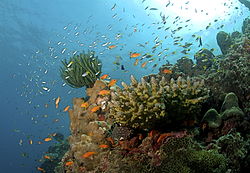










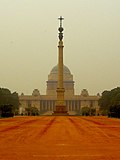














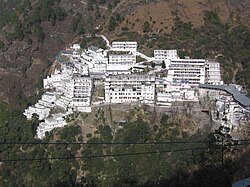


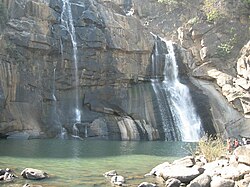























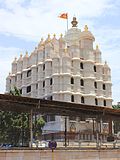


![Sahyadri: One of the most biodiverse regions in the world.[42]](https://upload.wikimedia.org/wikipedia/commons/thumb/0/05/Sahyadri_Parvatmala.jpg/120px-Sahyadri_Parvatmala.jpg)





